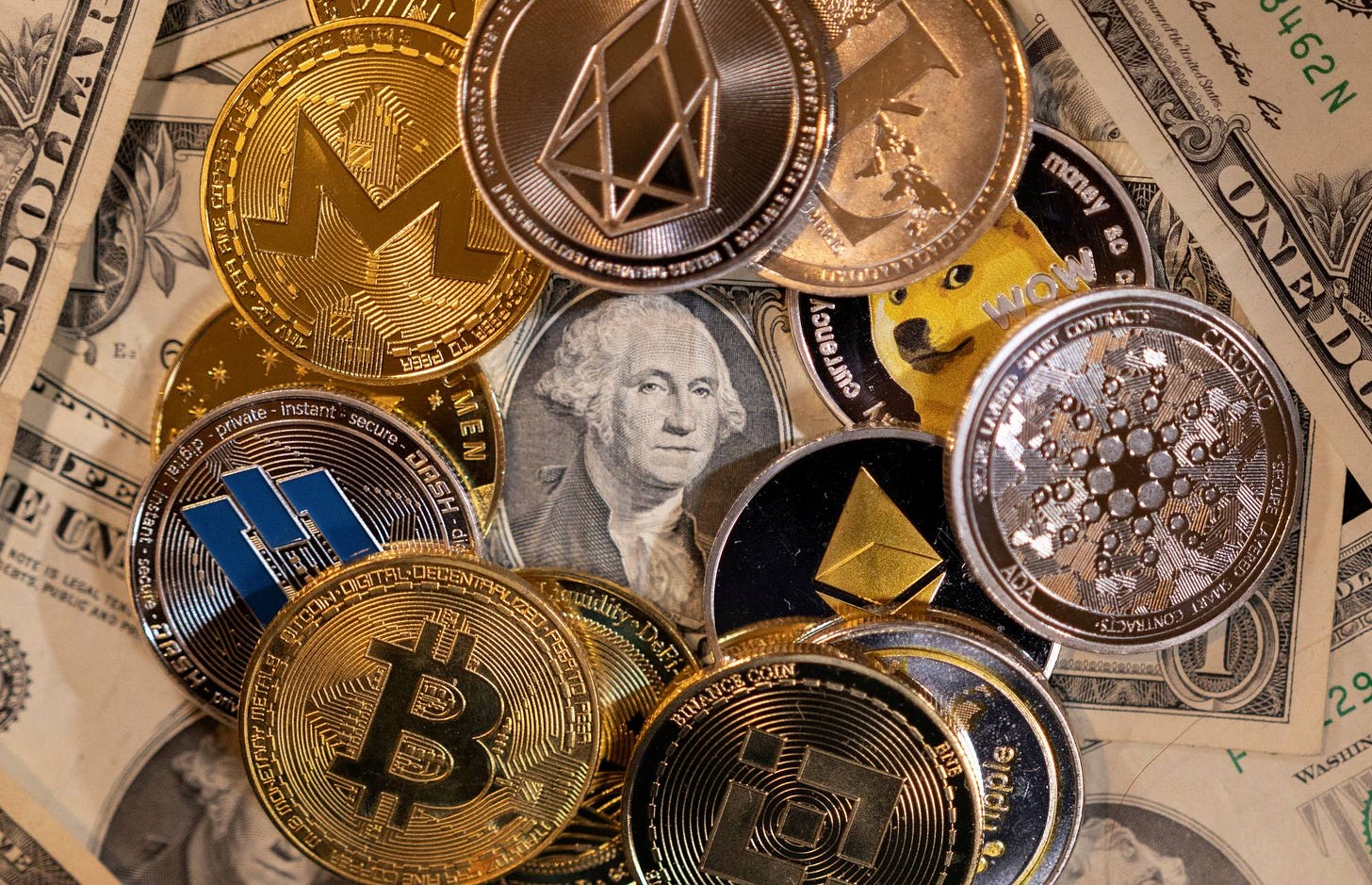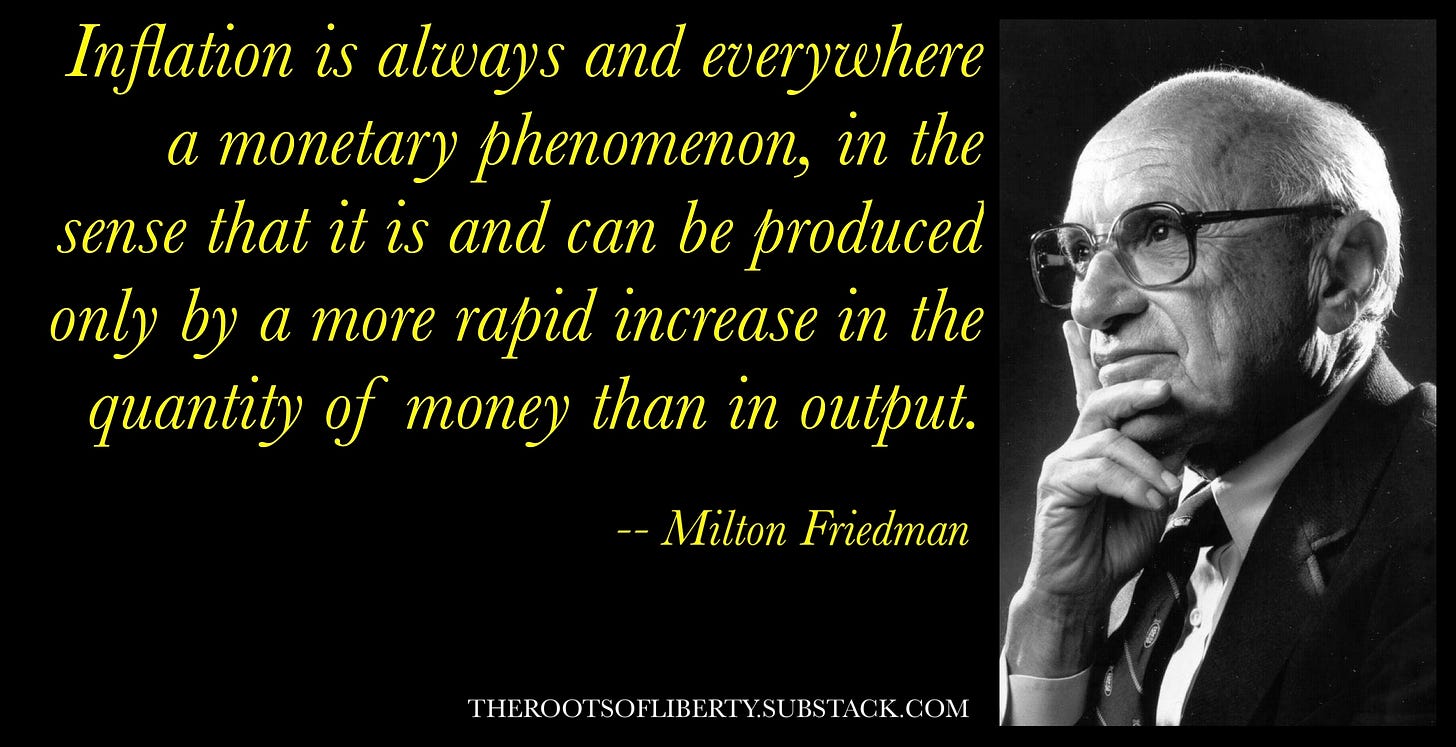The big news these days that isn't related to the mid-term election is the collapse of the FTX cryptocurrency exchange and the evaporation of $2B in investor wealth. The story is still unfolding, so rather than dive into its particulars, today I discuss what cryptocurrency is, isn't, should be, and shouldn't be.
Libertarians and other small-government types cheered the emergence of cryptocurrencies as alternatives to government-created money. In theory, they’re little different: US dollars are "fiat money," i.e. not backed by anything of tangible value (the US went off the gold standard in 1971). Cryptocurrency isn't either. Both have value by popular agreement - we generally accept that we can exchange such money for goods and services. Different governments issue their own forms of fiat money, and to my knowledge, there isn't a government in the world that has a gold standard any more.
What keeps money valuable is control of its supply, i.e. how much of it exists. Inflation occurs when the money supply grows faster than the goods and services an economy produces grows. As the great Milton Friedman tells us:
The designers of cryptocurrencies are aware of this, and any crypto that doesn't manage its growth will quickly become worthless - even more quickly when it's abandoned by potential users. Well-designed crypto offers (offered?) the promise of an inflation-resistant medium of exchange, existing apart from any ability by the government to simply "print" more of it to feed its various rapacities.
Note these words: "medium of exchange."
That was crypto's big promise and boon to liberty. A reliable medium of exchange that exists outside government control and manipulation, that can't be inflated the way government monies can, that is anonymous in use, and that is globally transferable is something that puts a smile on privacy advocates and inflation-suspicious.
Unfortunately, human nature tried to turn crypto into something it wasn't intended to be: an investment.
As it came onto the scene, and more and more people learned of it and found ways to convert their dollars or euros or yen or pounds or francs or whatever into Bitcoin and its ilk, demand for crypto increased dramatically. The laws of economics being what they are, limited supply and growing demand meant higher "prices," i.e. exchange rates.
Soon, people lost sight of the 'exchange rate' concept, and looked at crypto as if it were gold, or company stock, or crude oil, or real estate, or some other valuable asset. They saw the skyrocketing "price," got lured by the "get rich quick" promise, and inflated a bubble.
Businesses sprung up, purportedly as repositories for crypto and as mechanisms for exchange, but in people's eyes they were brokerages, places to send dollars or euros so that they become crypto, in order to make big bank for them.
"Get rich quick" is very appealing, but it's also a Big Lie. Barring the rare stroke of luck, success in life is via the boring: You accumulate wealth by steadily saving (i.e. spending less than you earn), and investing those savings in quality assets. You get fit by steadily exercising in a rational and sustainable way, and make gains across months and years. You lose weight by eating a few hundred calories below break-even, for a longer period of time than it took to gain that weight. You get better at something by studying or practicing, even if only a little, every day or close to every day for months and years.
The recipe for success is just two ingredients: pressure and time.
Problem is, people don't like boring, we don't like slow-and-steady, we are wired to instant gratification over delayed success. We suffer from FOMO - Fear Of Missing Out. So, we are susceptible to fad diets, to the latest exercise crazes, to "eat this and you'll be healthy!" superfood proclamations, to "learn a language in a week" stunts, and to get-rich-quick promises.
Market forces being inexorable, people inclined to leverage such innate behavioral tendencies emerge, and among them appear the scammers. But, even if we exclude the scammers from the equation, it remains that people have come to view crypto as an investment by which to make money, not as a form of exchange that hedges against inflation and protects privacy. Again, this is the result of human nature.
Over time, and as crypto becomes normalized (banks and credit card companies are building crypto infrastructure, and people are taking wages and and salaries in crypto), it may ultimately return to its original 'means of exchange' promise. This form of normalization, however, undermines its promise of anonymity, meaning that its utility will boil down to inflation-hedge. That's still a positive, and I'm sure structures wherein anonymous or semi-anonymous transfers can take place will remain and proliferate, but the first step is to change people's perception.
Crypto, like dollars or euros, is not an investment. Cash in a mattress loses value. Even cash in an interest-bearing savings account or certificate of deposit loses value - those rates of return never match inflation. Crypto may prove to be a net-positive asset in an inflationary time, but right now, because it's being treated by so many as a form of gambling, that promise is also off in the future.
The lesson here? Don't "invest" in cryptocurrency, not unless losing your investment is acceptable. It's not quite like betting on a horse, but it's not much different, either. Understand it for what it is, and accept what it isn't. Losing your life savings on a crypto investment gone wrong falls under "you should have known better."
Thank you for reading! If you enjoy The Roots of Liberty, please subscribe (if you have already, thank you!), and please recommend the blog to your friends. Social media has proven wholly unreliable in sharing my posts, subscribing is mightier than the shadow-banners, and subscriptions motivate my productivity.
If you really like The Roots of Liberty and want to help keep it rolling, please consider becoming a paying subscriber here at Substack, or at a lighter level as contributor to the blog via Patreon. I’ve started offering an expanded serialization of my short book, “End the War On Drugs,” every Sunday, for my paid subscribers.
Thank you, again, for your support!
Peter.





Good analysis, but there is one very important point left out. Even as a medium of exchange, a cryptocurrency (like any other currency) is an investment vehicle - that is, a floating store of value, depending on public perception of that value. It's the principle on which FOREX markets operate.
The difference between FOREX and cryptomarkets are somewhat related to the way currency valuations are regulated. Should any nation's currency become overly devalued that nation's government and/or central bank can take steps to increase it's valuation. Cryptomarkets do not have any sort of third-party regulation, and that opened the door to bad actors. FTX might be the worst of them (so far?), but all of the "exchanges" operate by their own rules and manipulate values to best suit their needs.
Back when this was all new and exciting, I said the real value wouldn't be in cryptocurrencies but in the technology that powers them: blockchain. The security and anonymity it provides is unparalleled by anything else and is exploding across the finance and tech sectors.
You know who else hates slow and steady investing? The government.